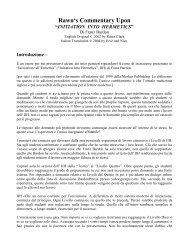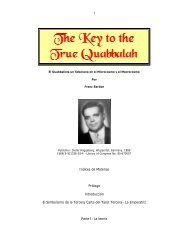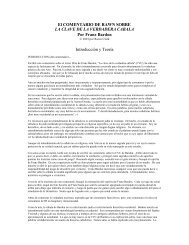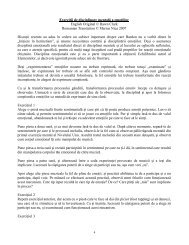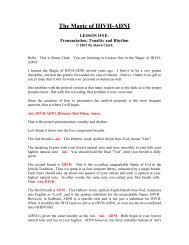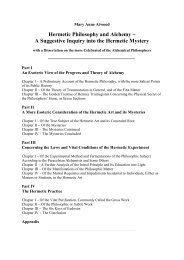Secrets of the Adepts - A Bardon Companion
Secrets of the Adepts - A Bardon Companion
Secrets of the Adepts - A Bardon Companion
You also want an ePaper? Increase the reach of your titles
YUMPU automatically turns print PDFs into web optimized ePapers that Google loves.
1. That by Wine, Spirit <strong>of</strong> Wine, and Aqua Vitæ common, is not meant Aqua Ardens, with<br />
which it is impossible to reduce or distil common Sal Armoniack into a liquid substance, and<br />
though it might, yet that Menstruum would be Common, not Philosophical, being made<br />
without <strong>the</strong> Spirit <strong>of</strong> Philosophical Wine.<br />
2. That <strong>the</strong>se Menstruums are made <strong>of</strong> all Volatile Salts.<br />
3. That <strong>the</strong> Menstruums <strong>of</strong> this Kind are <strong>the</strong> Magisteries <strong>of</strong> Volatile Salts. Mix <strong>the</strong><br />
Essence <strong>of</strong> Philosophical Wine with <strong>the</strong> Magistery <strong>of</strong> any Volatile Salt, and you will in a<br />
moment make a Menstruum <strong>of</strong> this fourth Kind.<br />
4. That <strong>the</strong>se Menstruums may be also made by Parisinus his way <strong>of</strong> Cœlum melleum,<br />
namely by Circulation, and <strong>the</strong>refore called Circulatums, common Sal Armoniack Circulated,<br />
Salt <strong>of</strong> Urine, Blood, Harts-horn, etc Circulated, or <strong>the</strong> Water <strong>of</strong> Sal Armoniack Circulated,<br />
<strong>the</strong> Water <strong>of</strong> <strong>the</strong> Salt <strong>of</strong> Blood Circulated, etc.<br />
5. That it is very uncertain what Philosophical Menstruum Trismosinus meant by Spirit <strong>of</strong><br />
Wine: For divers Menstruums have been by <strong>the</strong> <strong>Adepts</strong> signified by <strong>the</strong> same Name <strong>of</strong> Spirit <strong>of</strong><br />
Wine; for <strong>the</strong> most part <strong>the</strong>y meant <strong>the</strong> simple Spirit <strong>of</strong> Philosophical Wine, sometimes <strong>the</strong><br />
same acuated after a different manner, that is, <strong>the</strong> simple Vegetable Menstruum. So Basil in<br />
his Book <strong>of</strong> Conclusions, prepares <strong>the</strong> Oyls <strong>of</strong> Metals with Spirit <strong>of</strong> Wine; by which he<br />
declares himself to have meant not <strong>the</strong> simple Spirit, but a simple Vegetable Menstruum, in<br />
<strong>the</strong> preparation <strong>of</strong> <strong>the</strong> Oyl 0f Mercury, he commanding this open Metal to be by <strong>the</strong> Spirit <strong>of</strong><br />
Wine, rectify’d first with Salt <strong>of</strong> Tartar, (which Menstruum we shall have in <strong>the</strong> following<br />
Kinds) reduced into an Oyl; which <strong>the</strong> rest <strong>of</strong> <strong>the</strong> Metals being more compact, do more<br />
require: Sometimes also <strong>the</strong>y did by <strong>the</strong> Spirit <strong>of</strong> Wine intend Vegetable Menstruums<br />
compounded; so Lully, among <strong>the</strong> o<strong>the</strong>r Names <strong>of</strong> Circulatum majus, reckons up also Aqua<br />
Vitæ. This Menstruum, saith he, <strong>the</strong> Wise Men called by almost innumerable Names, <strong>the</strong><br />
Acetum acerrimum, which converts Gold into a Spirit; this is Aqua Sicca, Aqua Solis, Aqua<br />
Vitæ, in Exp. 25. Yea, Mineral Menstruums also <strong>the</strong> <strong>Adepts</strong> more than <strong>of</strong>ten call by <strong>the</strong> Name<br />
<strong>of</strong> Aqua Vitæ. So Albertus in suo Composito de Compositis, pag. 939. Volum 4. Theat.<br />
Chym. Distills a Mercurial Mineral Water; <strong>of</strong> which thus: Behold, this is <strong>the</strong> Aqua Vitæ, <strong>the</strong><br />
Acetum Philosophorum, and Lac Virginis, by which Bodies are resolved into <strong>the</strong> first Matter.<br />
Though <strong>the</strong>refore it be uncertain to Divine what Spirit <strong>of</strong> Wine out <strong>of</strong> such a vast number <strong>of</strong><br />
Menstruums Trismosinus intended; yet shall we not much err from <strong>the</strong> Truth, if we take any<br />
Menstruum whatsoever, ei<strong>the</strong>r Simple or Compounded, Vegetable or Mineral, instead <strong>of</strong> this<br />
Spirit; for we may with all promiscuously perfect <strong>the</strong> same Philosophical Work, differing only<br />
in degrees, as being stronger or weaker, which common Spirit <strong>of</strong> Wine make altoge<strong>the</strong>r<br />
impossible, and fallacious: Yet notwithstanding Directions <strong>the</strong>re are, which may in this<br />
ambiguity make us more certain; as,<br />
1. Any ambiguous, or unknown Name <strong>of</strong> any Menstruum, is easily known by its<br />
Synonima’s, if <strong>the</strong>re be any in <strong>the</strong> same Book, or o<strong>the</strong>r Writings <strong>of</strong> <strong>the</strong> same Adept, as for<br />
Example: If in <strong>the</strong> Description <strong>of</strong> <strong>the</strong> Balsamum Samech <strong>of</strong> Paracelsus, you know not what <strong>the</strong><br />
Circulatum minus is, <strong>the</strong> Synonima’s (produced by Paracelsus himself, Lib. 10. Arch. in <strong>the</strong><br />
Description <strong>of</strong> <strong>the</strong> Circulatum majus, (where it is called Primum Ens Salis, and Arcanum<br />
Salis) denoting moreover <strong>the</strong> Nature, yea, and preparation <strong>of</strong> <strong>the</strong> Menstruum, delivered here<br />
perhaps less clearly (quatenus Menstruum) but elsewhere more plainly under <strong>the</strong> Title <strong>of</strong><br />
Essence or Primum Ens) do put it out <strong>of</strong> all doubt, that it is <strong>the</strong> Arcanum <strong>of</strong> common Salt. But<br />
I said, Synonima’s in <strong>the</strong> Writings <strong>of</strong> <strong>the</strong> same, not <strong>of</strong> ano<strong>the</strong>r Adept, because <strong>of</strong>tentimes<br />
o<strong>the</strong>rs intended ano<strong>the</strong>r thing by <strong>the</strong>se Names, yea that Name which hath in one Book <strong>the</strong><br />
same signification with <strong>the</strong> rest, hath commonly in ano<strong>the</strong>r, though <strong>of</strong> <strong>the</strong> same Author, a<br />
signification different from <strong>the</strong>m; and <strong>the</strong>refore that Synonymum must, if possible, be had out<br />
<strong>of</strong> <strong>the</strong> same Book, which must <strong>the</strong>n be compared both with o<strong>the</strong>r Writings <strong>of</strong> <strong>the</strong> same Author,



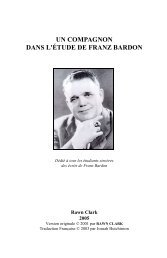
![Magie de YHVH-ADNY et Archeus[1]](https://img.yumpu.com/16926522/1/190x245/magie-de-yhvh-adny-et-archeus1.jpg?quality=85)
